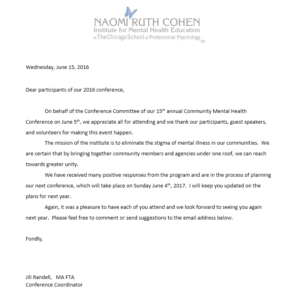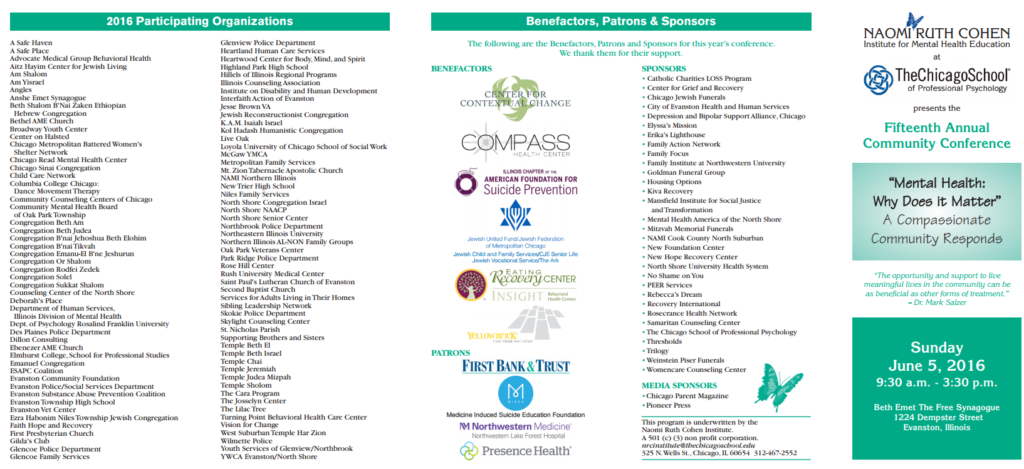We saw great success at the 2016 Community Mental Health Conference. More than 300 people attended and we had several dynamic, knowledgeable speakers, including Cook County Sheriff Thomas J. Dart, Temple University professor Dr. Mark Salzer, McGaw YMCA CEO Mark Dennis and CARA Program Director Jesse Teverbaugh. Our speakers captivated attendees as they imparted their knowledge about mental health and taking care of the most vulnerable.
The best way we determine how successful our annual conference has been is through the reaction of attendees, and this year’s conference goers had many wonderful things to say.
“I must admit that if at times I felt along(sic) and isolated in my plight, this counts as one of the days I felt the farthest from the lonely view.”
“I had the most magnificent time… I had the great pleasure of interacting with other professionals and the guest speakers provided captivating testimonials.”
“This conference gave me the opportunity to see that we still need other alternatives to helping people with mental illness.”
“Reaffirmed {my} hope in mental health.”
Other attendees mentioned having renewed hope as one of the benefits of the conference as well, which pleases us because the conference, this year titled, “Mental Health: Why does it Matter? A Compassionate Community Responds,” was, as founder Lawrence Cohen expressed early on, “designed not only to inform and teach, but also to enable us all to learn more about the most vulnerable in our society, and how each of us can help.”
Our call for help in accomplishing this did not go unheeded as we hosted an unprecedented 21 discussion groups, all with presenters who were excited to talk about and share information on what they know so much about. Attendees were treated to discussion groups featuring such heady topics as loss through violent death, restorative justice with a trauma informed lense, crisis intervention training, homeless rights and justice, the impact of cultural and historical trauma and the interplay of trauma, and addiction and mental health in the LGBTQ community.
Just as in years past, we packed a lot of powerful information into a few short hours, prompting such comments as:
“It broadened my scope of knowledge and the impact that mental health has on the world and community.”
“…appreciative of broad spectrum.”
“Fantastic content and quality presenters…”
The day was filled with inspirational moments, as when Sheriff Dart talked about the innovative ways in which he and his staff have managed to run the largest mental health facility in the country, even though his facility is the Cook County Jail, or when Dr. Salzer told the audience how community inclusion of people with psychiatric disabilities is not only possible, but is one of the best possible solutions for those who live with such disabilities. We were also inspired by Jesse Teverbaugh who shared his amazing journey from growing up the child of a father who was successful in his suicide attempt to living through depression and homelessness to ultimately transitioning from client to Director of Student and Alumni Affairs of the Cara Program, whose mission is to prepare and inspire motivated individuals to break the cycle of homelessness and poverty.
As we prepare for our 16th annual conference to take place on June 4, 2017, we are most particularly inspired by a comment from an attendee who simply said, “I learned how the community can help the mentally ill.”
And to the attendee who said, “I am eager for next year’s conference;” please know that we are just as eager to see you!
Special thanks from Jill Randell our Conference Coordinator to those who attended our 15th Annual Conference

Thanks to all who attended our 15th Annual Community Mental Health Conference on June 5th, 2016.

“Mental Health : Why Does it Matter” A Compassionate Community Responds
About our Day
Our conference is designed to inform, teach and learn more about the most vulnerable in our society and how each of us can help.
Doors will open at 8:30 a.m. for registration and exhibit viewing. The program runs from 9:30 a.m. to 3:30 p.m. Mark Dennis will deliver a speech with words of hope at 9:30 a.m. The presenters, Sheriff Thomas Dart, Dr. Mark Salzer, Jesse Teverbaugh will speak. Dr. Tiffany Masson will lead the question and answer session. Twenty two discussion groups are offered. The first discussion group will begin after the Q & A with a box lunch provided. Following the first discussion group, there will be a dessert reception and an opportunity to visit exhibits. The second discussion group begins at 2:15 p.m. PLEASE NOTE: ALL DISCUSSION GROUPS ARE ELIGIBLE FOR CEU’s
WATCH FOR THE BROCHURE IN APRIL
ABOUT OUR SPEAKERS
Opening Words: (Reverend) Mark A. Dennis Jr. President and Chief Executive Officer of the McGaw YMCA, a pioneer in strengthening Evanston and North Shore communities focusing on youth, healthy living and social responsibility. Previously Mr. Dennis was Senior Pastor of the historic Second Baptist Church in Evanston. He has been a facilitator and consultant to numerous houses of worship, universities, and hospitals throughout the United States.
Presenters:
- Thomas J. Dart Sheriff of Cook County. Since becoming Sheriff in 2006, Mr. Dart has brought an aggressive, yet innovative approach to law enforcement. A former prosecutor and state legislator, he has long fought to protect the most vulnerable in our society. On any given day, there are over 2,500 people with diagnosed mental illness housed in the jail under the Sheriff’s responsibility, making it the largest mental health facility in the country. In an Chicago Tribune opinion editorial article, Mr. Dart wrote, “The mentally-ill have been systematically neglected and demonized, and ultimately criminalized in this country. Let us finally prioritize mental health and see justice for the mentally-ill out of respect for their humanity, not of our fear.”
- Mark Salzer, Ph.D. Professor and Chair of the Department of Rehabilitation Sciences at Temple University, and Director of the Temple University collaborative on Community Inclusion of Persons with Psychiatric Disabilities. In addition, Dr. Salzer has published over 90 articles and book chapters, and has given over 200 presentations around the world promoting community inclusion. His current research includes a national study of environmental factors that affect community participation and involvement of individuals with mental illness. They use GPS to track mobility and engagement in the community, and studies of the effectiveness of interventions to enhance educational attainment, employment, and otherwise meaningful participation in the community. “The opportunity and support to live meaningful lives in the community can be as beneficial as other forms of treatment.”
- Jesse Teverbaugh Director of Student and Alumni Affairs, The Cara Program. Cara prepares and inspires motivated individuals to break the cycle of homelessness and poverty, transform their lives, and find quality employment. Since its founding in 1991, Cara has evolved as the best job training and placement provider placing more than 5,100 individuals into permanent employment. They have likened themselves as a friend who coaches and supports motivated individuals on their journey. “I know what it feels like to be in pain and not have any hope.” Jesse began as a student, rose to a trainer, supervisor, and now Director. He motivates hundreds of men and women each year to “look with new eyes,” radically transform their lives, and achieve long –term self sufficiency.
Moderator
Photo Tiffany Masson, Psy.D., Interim Campus Dean, The Chicago School of Professional Psychology- Chicago, and Vice President of E-Learning and Global Innovation. In Dr. Masson’s nine years of service to the school, she has held a number of leadership positions including Department Chair of International Psychology and Director of Social and Behavior Sciences. In the role of interim Campus Dean, she provides oversight and advances growth for the institution through strategic positioning in the community and higher education market, and is responsible for operational efficiencies that further institutional initiatives. As Vice President of E-Learning and Global innovation, she is charged with positioning TCSPP as a national and international leader in technology based learning.
As each panelist took the stage to tell his or her story, Congresswoman Schakowsky’s assertion early in the program that few people with a mental illness feel comfortable sharing their story was proven correct. Each speaker acknowledged a reluctance to talk about their mental illness, to seek help. The acknowledgement, either intimated or told candidly, was evident in every story. Reverend Dr. Magrini, who has bipolar disorder and whose 23-year old son with bipolar disorder committed suicide, shared her emotional journey of suffering, finally seeking treatment and how self-care and introspection and learning to rely on family, friends, and her spirituality have all helped her.
The inspiring, day-long conference also included 36 exhibitors and 18 smaller discussion groups, which covered a range of topics, including how mental illness is covered in the media, military families dealing with stigma, keeping stigma around mental illness out of our schools, and laws and legislation addressing stigma. Each discussion group was led by professionals that shared expert knowledge, with many offering workable solutions, prompting at least one attendee to comment, “I have increased awareness of different types of stigma and how we as individuals and as a society can respond.”
When president of The Chicago School of Professional Psychology Michele Nealon-Woods, Psy.D. spoke to the audience, she stressed, “We can no longer understand health without the full integration of mental health.”
Here at the Naomi Ruth Cohen Institute for Mental Health Education, we strongly agree with Dr. Nealon-Woods’ viewpoint and it’s one of the reasons why we have the conference every year, and open it to the community. The conference isn’t just for mental health professionals, it’s for anyone affected by mental illness or anyone interested in mental health. As NRCI founder Larry Cohen said at the conference, “We’d like to think {that at} our institute we spread pebbles into the pool and they ripple around and affect the entire community.”
To hear the keynote speeches in full and the panel discussion that followed, click here and here. The panel discussion was moderated by Michael Horowitz, Ph.D., president of TCS Education System.
Click here for a copy of the conference brochure. Click here to download a copy of our Stigma Poster. If you have any questions, please feel free to call the NRCI office at 312.467.2552.

